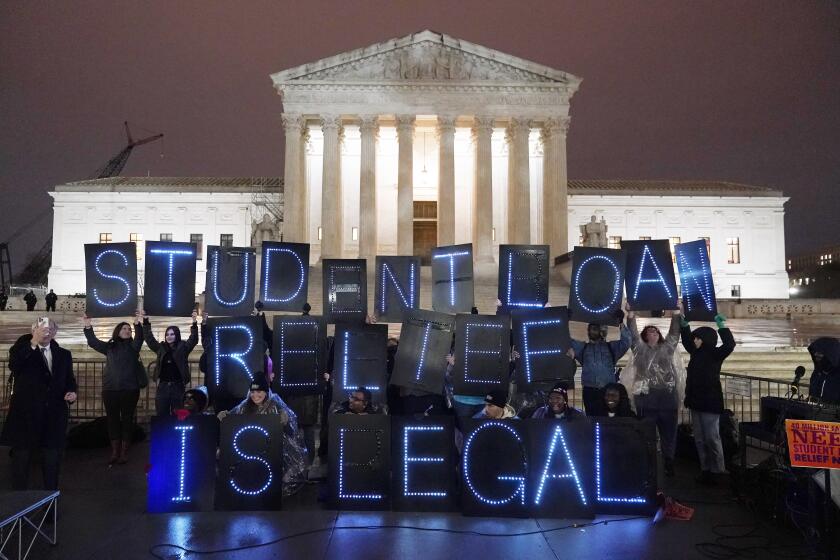That Society Is Color Blind Is an American Myth : Scholarships: The Office of Civil Rights should find creative ways to open, not close the doors to educational opportunity.
Attempts by the Department of Education’s Office of Civil Rights to quash minority scholarships are appalling not merely because of what the agency is doing, but also because of what it is ignoring. By devoting its energies to erecting--rather than removing--barriers to educational opportunities for blacks, Latinos and other minorities, the federal agency is willfully neglecting the crisis in minority education.
Take an average group of 100 black California children entering public school this year. At current attrition rates, 50 will never graduate. Out of the original 100, only two will be prepared for the University of California. So what has the civil-rights office been doing for these two students? Zealously checking to ensure that UC does not admit them too readily. Telling them that the agency would be glad to approve scholarships if they were children of alumni, cellists or athletes--but that aid meant to correct 300 years of systematic, race-based exclusion from the educational mainstream is often illegal and always suspect.
Why is the civil-rights office doing this? It claims that its evolving scholarship policy is based on the requirements of the law. The truth is that it is derived from tortured misreadings of the law.
In defending his original announcement barring race-exclusive scholarships at the Universities of Alabama and Louisville, Michael L. Williams, head of the office, cited a 1989 Supreme Court ruling rejecting a specific program that set aside a percentage of city contracts for minority-owned businesses. But in that decision, the court said it would sustain minority set-aside programs that address documented, uncorrected discrimination--precisely the kind of discrimination that has characterized the Universities of Alabama and Louisville. Both have long histories of officially sanctioned segregation, and minority students are still severely underrepresented at both. The assertion that these institutions could not establish race-based scholarships distorted the law and violated common sense.
In its latest attempt to reverse parts of this alarming policy, the civil-rights office continues to misrepresent the law. It has now decided that universities may fund race-exclusive scholarships with private donations but private universities may not fund such scholarships “with their own funds.” Legally, that is patent nonsense.
For one thing, the law clearly supports the notion that a private university seeking to remedy egregious, past discrimination can voluntarily fund race-specific scholarships. For another, the Civil Rights Restoration Act of 1987 bars an institution that receives public funds from discriminating in all of its operations. If it were “illegal” for universities to fund minority-designated scholarships--it is not, but that is Williams’ premise--then it would also be illegal for them to administer scholarships as well.
If the civil-rights office were truly concerned about the law, it would have conducted a comprehensive legal analysis before announcing this policy. If it were truly concerned about sound education, it would have learned that these scholarships are a vital part of the recruitment efforts used to let minority students know that higher education is affordable. It would have discovered that scholarships based on race encourage young minority students by assuring them that they will have an opportunity to attend college if they work hard enough--despite their skin color, despite their poverty, despite their understandable suspicion that they are unwelcome in a majority-white culture. But the civil-rights office apparently did not even consult with educators before establishing a policy that would affect tens of thousands of students.
The fact is that this policy is based on neither law nor coherent educational philosophy. It is based on a combination of misguided right-wing ideology and political expediency. Adherents of this ideology mistakenly believe that we can establish a “color-blind” society right now. They hold that centuries of unrelenting oppression of minorities somehow can be magically wished away. They buy into the fantasy that when all of life’s advantages and disadvantages are weighed and measured, race-based scholarships somehow give an unfair, unseemly edge to people of color who have been excluded from the American mainstream since slavery. And they play directly into the hands of cynical Republican political operatives who want to make opposition to affirmative action the cornerstone of party strategy in the 1990s--for the sake of attracting votes from whites fearful of their own educational and economic prospects.
President Bush says he wants to be remembered as the “education President.” If that is true, he should order the Office of Civil Rights to rescind its original policy restricting minority scholarships and its subsequent modifications. He should direct the agency to spend its time finding creative ways to open up--rather than close--the doors of educational opportunity to all Americans. And he should not let educational policy be dictated by those who want to pretend that we have reached the mythical point where race doesn’t constrict destiny in America. Just ask the two black students eligible for UC or any of the 50 lost from the original 100 first-graders: That point is nowhere in sight.
More to Read
Sign up for Essential California
The most important California stories and recommendations in your inbox every morning.
You may occasionally receive promotional content from the Los Angeles Times.






